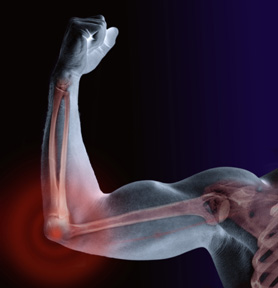Much of the pain experienced by at least 116 million adult Americans each year is preventable or could be better managed, says a new report from the Institute of Medicine (IOM). Ursula Wesselmann, M.D., Ph.D., professor in the Department of Anesthesiology, University of Alabama at Birmingham, was nominated as a member of the national committee that offered a blueprint for transforming prevention, care, education and research by 2015.
 Pain is a primary reason for clinic visits and prescribed medications, a major cause of disability and a key factor in quality of life and productivity. Given the burden in human lives, dollars and social consequences, the committee said relieving pain should be a national priority with a far-reaching strategy.
Pain is a primary reason for clinic visits and prescribed medications, a major cause of disability and a key factor in quality of life and productivity. Given the burden in human lives, dollars and social consequences, the committee said relieving pain should be a national priority with a far-reaching strategy.
The committee called for coordinated, national efforts of public and private organizations to transform the way in which the nation understands and approaches pain management and prevention to redress an issue that costs the nation between $560 billion and $635 billion annually.
The IOM report noted changes that could be implemented by the end of 2012:
- Create a comprehensive population-level strategy for pain prevention, treatment, management and research
- Develop comprehensive strategies to reduce barriers in care
- Support collaboration between pain specialists and primary-care physicians
- Designate a lead institute at the NIH to be responsible for moving pain research forward.
Successful pain treatment, management and prevention requires an integrated approach that responds to all factors that influence it, the report said. The majority of care and management should be provided by primary-care physicians and by patients themselves; specialty-care services should be reserved for more complex cases. Financing, referral, records management, and other systems need to support this flexibility.
Yet, many health-care professionals are not adequately prepared to provide the full range of pain care or to guide patients in self-managing chronic pain. Longer-term changes the report suggests:
- Training programs for dentists, nurses, physicians, psychologists and other health professionals should include pain education and promote interdisciplinary learning.
- Licensing and certification exams should include assessment of pain-related knowledge and capabilities.
- Programs that train specialists or offer training in advanced pain care need to be expanded.
The committee challenged Medicare, Medicaid, workers' compensation programs and private health plans to find ways to cover interdisciplinary pain care. Individualized care often requires consultation with multiple providers and more than one form of therapy, but systems are not designed to reimburse efficiently for this kind of approach and health-care providers are not organized for integrated patient management.
Due to its significant toll on individuals and society, pain warrants a higher level of attention and resources within the National Institutes of Health. The report recommends that NIH designate a lead institute to advance pain research and increase the scope and resources of its existing Pain Consortium. NIH, academic researchers and other public organizations should collaborate with private firms to advance research and development of new and improved therapies.
UAB's Department of Anesthesiology has robust programs both in pain research and clinical practice. Wesselmann is an internationally renowned expert on chronic pain syndromes in women who joined UAB from Johns Hopkins University in 2008.
Tony Jones, M.D., chair of the department, has a long-term vision for pain at UAB. His goal is to develop a center of excellence in pain treatment, research, and education that will include internationally recognized experts from the schools of medicine, dentistry and public health to develop a comprehensive approach to move new insights quickly from the laboratory to the bedside. Continued investment in pain research at UAB will help to accelerate the ability to diagnose, treat and eliminate acute and chronic pain in agreement with the vision and recommendations of the IOM report released today.
The study was mandated by Congress and sponsored by the National Institutes of Health.